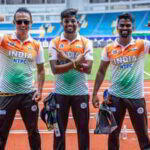VOCABULARY
By evidence alone: on the 2008 Malegaon blast trial :-
There are occasions when not only the accused but the criminal justice system itself is on trial. The case relating to the Malegaon blast of 2008 is one such. By overruling the National Investigation Agency’s finding that key members of a Hindu right-wing group called Abhinav Bharat were not involved in the explosion that killed at least six persons and wounded over a hundred in the Maharashtra town, the Special Court in Mumbai has chosen to let the evidence decide their guilt or innocence. It has framed charges against them for conspiracy, murder and other offences, including under the provisions of the Unlawful Activities (Prevention) Act. The Anti-Terrorism Squad of the Maharashtra police and the NIA have come to varying conclusions on the culpability of Abhinav Bharat members. The ATS chargesheet claims it was primarily a conspiracy hatched by Sadhvi Pragya Singh Thakur and Lt. Col. Prasad Purohit, among others. In a supplementary chargesheet, the NIA concluded there was either no or insufficient evidence to proceed against some of them. Special Judge S.D. Tekale has chosen to steer clear of pronouncing his decision on which of the two he would go by. Where two conflicting reports are on record, he ruled it is better to go through the trial and consider the evidence it brings. His decision is the right one and it rises above the competing narratives of the two agencies. What made this case politically sensitive was the debate over whether ‘Hindu’ or ‘saffron’ terror had come into being given the alleged role of an organisation with the objective of establishing ‘Hindu Rashtra’ in the country. Initially, an Islamist group was accused of being behind the blasts that took place in September 2006 at Malegaon, killing 37 people, but a later charge sheet said the perpetrators belonged to a group of Hindu activists. It took nearly ten years for those initially arrested to be discharged, for want of evidence. These factors cast an unfortunate shadow on the trial related to the 2008 case. Allegations surfaced that the NIA prosecutor was under pressure to dilute the charges against Pragya and others. Against this backdrop, it is better that the evidence, whether substantive or dodgy, is assessed at a trial, lest it be said later that there was any miscarriage of justice. Based on preliminary material, the judge has thrown out charges under the Maharashtra Control of Organised Crime Act. He has discharged three persons for want of evidence, and sent two to regular courts to be tried under the Arms Act. The rest will face trial. This decision augurs well for the integrity of the process, as it is the best way to put at rest suspicion that one agency tried to frame the suspects, while another was deliberately soft. It is important that this trial, although agonisingly delayed, is nothing but fair.













